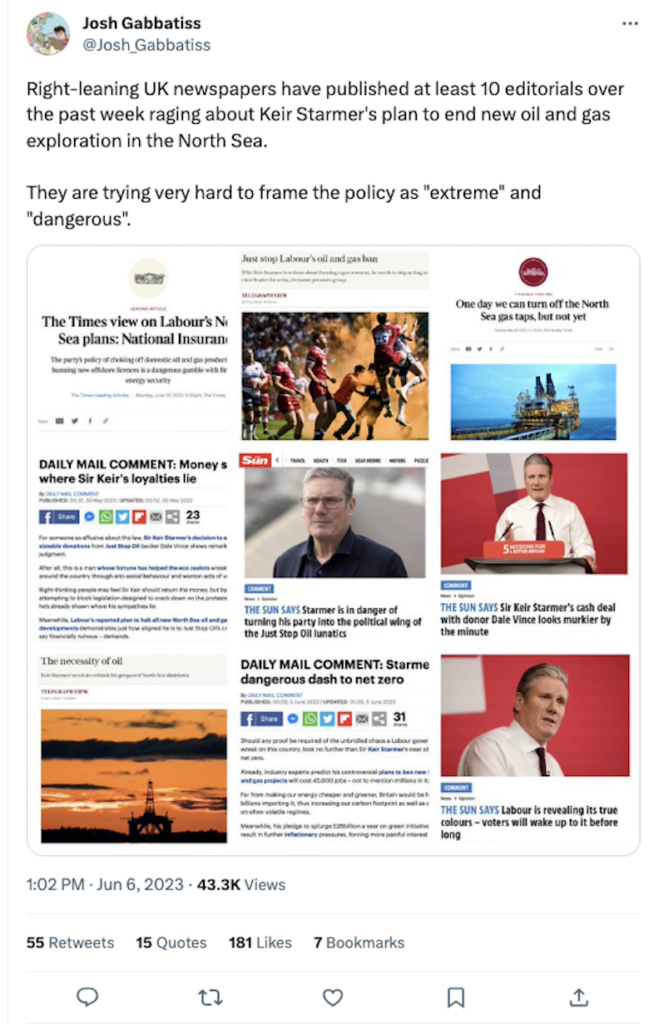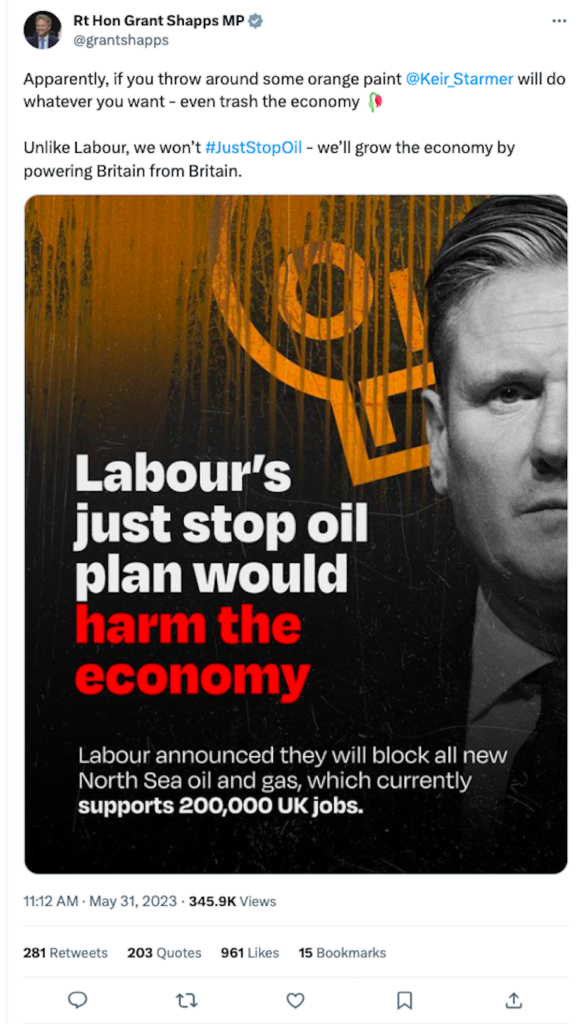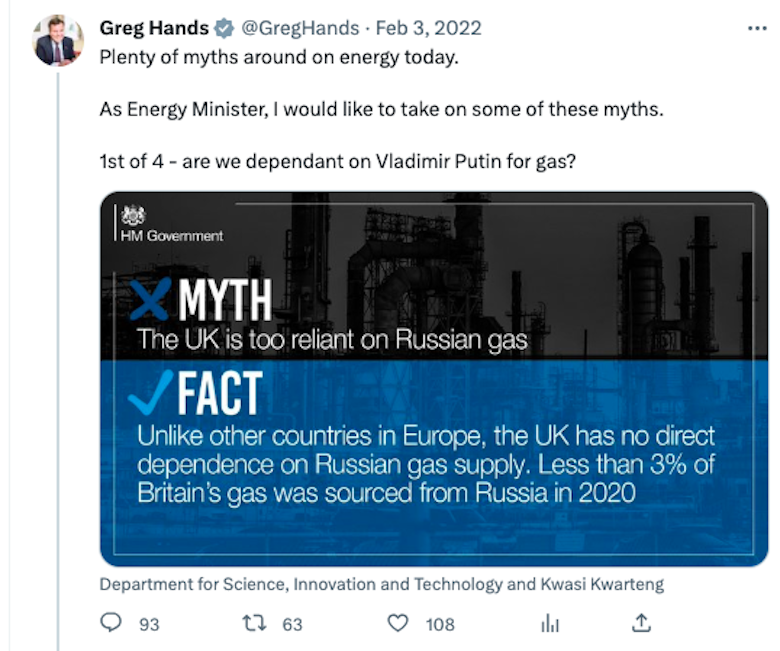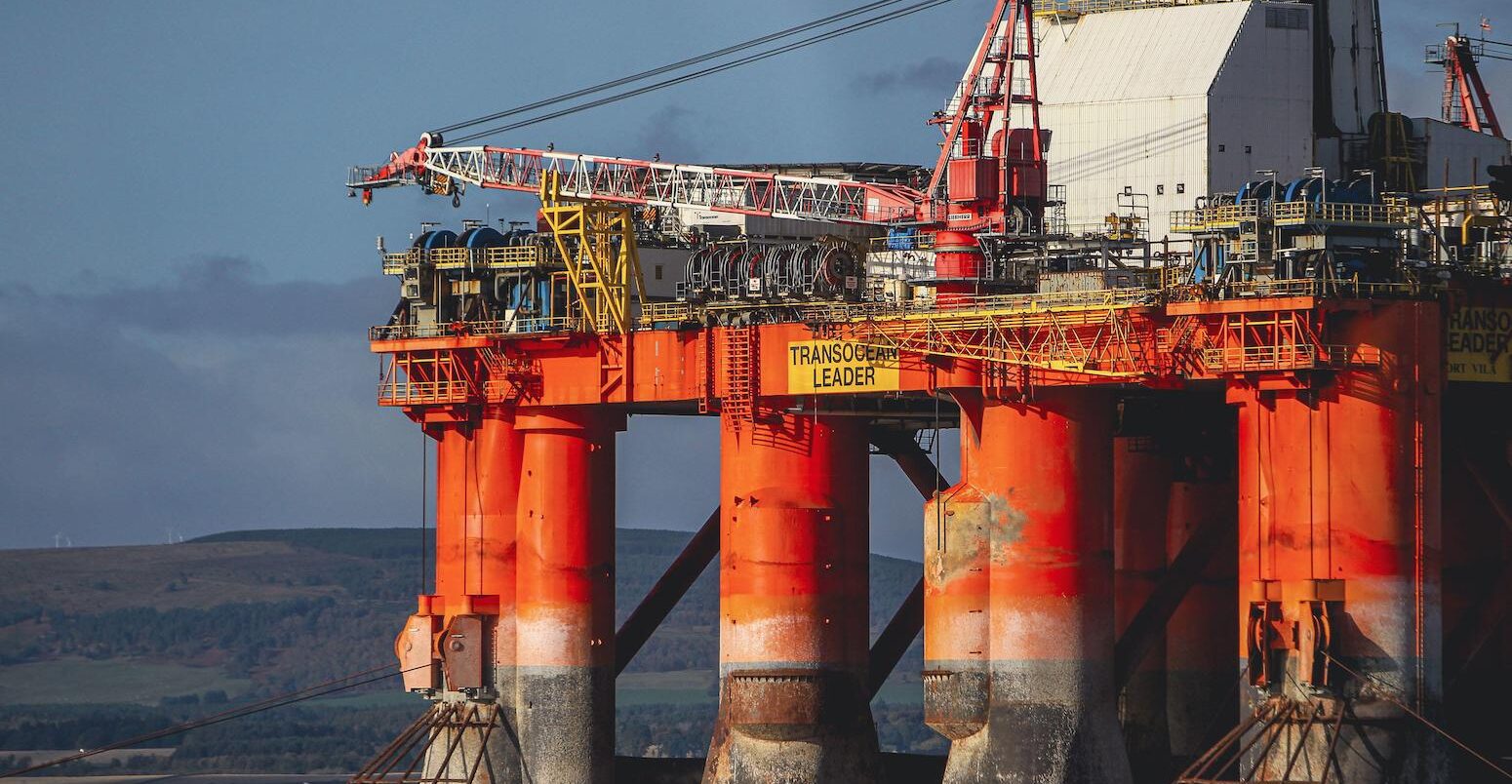
Factcheck: Why banning new North Sea oil and gas is not a ‘Just Stop Oil plan’
Daisy Dunne
06.08.23Daisy Dunne
08.06.2023 | 5:01pmOver recent days, a small but prominent group of Conservative politicians in the UK have attempted to whip up a frenzy over Labour’s pledge to end new oil and gas licences in the North Sea, if elected to power.
Among them is the country’s current net-zero secretary, Grant Shapps, who made a series of inaccurate claims about the pledge – which was first floated by Labour in 2021.
In a string of tweets and during media interviews, Shapps has called the idea of ending new licences a “Just Stop Oil plan” and claimed it would lead to production shutting down “overnight” and energy bills “skyrocketing”.
He also claimed it would increase the country’s reliance on oil and gas imports in the future. He said this would come at a greater climate cost and might even “harm the economy”.
On 7 June, his words were echoed by the prime minister Rishi Sunak, who told a huddle of journalists that Labour was allowing “eco-zealots at Just Stop Oil” to write its energy policy.
Below, Carbon Brief walks through why all of these claims are, at best, highly misleading and, at worst, completely false – and examines how sections of the media have reported criticism of Labour’s promise to end new oil and gas licences.
- Why is there controversy around Labour’s pledge to end new oil and gas?
- Claim 1: Labour’s pledge to end new oil and gas licences is a ‘Just Stop Oil plan’
- Claim 2: Ending new oil and gas licences would stop production ‘overnight’
- Claim 3: Ending new oil and gas would lead to a heavier reliance on imports in future
- Claim 4: Relying more on oil and gas imports would come at a greater climate cost
- Claim 5: Ending new oil and gas licences would ‘harm the economy’
- Claim 6: Ending new oil and gas licences would cause energy bills to ‘skyrocket’
- Claim 7: Ending new oil and gas licences could threaten jobs
Why is there controversy around Labour’s pledge to end new oil and gas?
On 28 May, the Sunday Times published a frontpage story stating that a “Labour source” had said that leader Keir Starmer planned to “block all new North Sea oil and gas developments” as part of his “green prosperity plan”, if elected to power. It added that Starmer is expected to make the pledge during a speech made in Scotland later this month.
Back in 2021, Starmer told the Guardian that Labour would set a “hard-edged timetable” for ending oil and gas exploration in the North Sea, although he refused to say when this should happen.
In January of this year, he hinted to a crowd in Davos that he would end new oil and gas licences if elected, according to BusinessGreen.
The Sunday Times story initiated a flurry of media reports.
The next day, the Times reported that the pledge had been met with “fury” from industry, business and political leaders in the northeast of Scotland.
The Daily Mail carried reaction to the news from climate-sceptic Conservative backbenchers Jacob Rees-Mogg and Craig Mackinlay. Mackinlay, leader of the climate-sceptic Net Zero Scrutiny Group of Conservative politicians, called the pledge “incoherent” and “dangerous”.
The Financial Times reported that the head of the GMB union, one of the UK’s largest and most influential workers’ unions, called on Starmer “to scrap plans to ban all new North Sea fossil fuel extraction licences”. (GMB union head Gary Smith has previously been critical of actions to tackle climate change.)
Along with the initial reports came a wave of editorials and comments.
The Sunday Times published an editorial on the same day as its frontpage story, describing the pledge as an “economically risky idea that would risk leaving Britain permanently at the mercy of international price fluctuations”. (In fact, the prices of oil and gas are already set on international markets, as shown during the global energy crisis.)
An editorial in the Daily Telegraph said the pledge indicated that Labour was acting as a “cheerleader for a tiny, tiresome pressure group” – a reference to the campaign group Just Stop Oil.
Criticism of Starmer’s policy continued to mount in the following days.
On 29 May, the Daily Mail published a frontpage story on how, since 2014, Labour has accepted £1.4m in donations from the renewable energy entrepreneur Dale Vince, who has also given money to Just Stop Oil. The story was widely featured in UK media.
By early June, the Daily Mail had published two further frontpages broadly criticising Labour’s “eco plans”, with claims that the party was waging a “class war on middle Britain”.
On 5 June, the Times published a frontpage story noting that the GMB union, along with the union Unite, had criticised Labour’s pledge to end new oil and gas.
Carbon Brief analysis shows that right-wing newspapers published at least 10 editorials criticising Labour’s pledge to end new oil and gas licences, in the days following the release of the Sunday Times article first breaking the news.
After the news broke, the Sun published seven editorials in a row attacking Labour’s pledge and its climate policies in general.
Joining in on the outrage – and parroting many of the same criticisms as the right-wing press – was the UK’s net-zero secretary Shapps.
After the story broke on 28 May, Shapps claimed to the Sun that the plan would “not only risk hundreds of thousands of jobs, but strengthen Putin’s campaign to use energy as a weapon against the west”. (Separately, the outlet accused Starmer of “pandering to eco-loons”.)
In a tweet posted on 31 May, Shapps called the idea of ending new licences a “Just Stop Oil plan” that would “harm the economy” and lead to job losses.
On 1 June, he posted an interview clip, where he further claimed that an end to new licences could lead to production shutting down “overnight” and energy bills “skyrocketing”.
By 7 June, his words had been echoed by the prime minister, who on a trip to Washington DC told reporters that it “appears” that “eco-zealots at Just Stop Oil are writing Keir Starmer’s energy policy”.
Shapps mimicked this wording in another tweet targeting Labour’s pledge on 8 June.
Below, Carbon Brief examines the evidence behind each of his claims.
Claim 1: Labour’s pledge to end new oil and gas licences is a ‘Just Stop Oil plan’
The campaign group Just Stop Oil is certainly not the only one to call for an end to new oil and gas development.
Back in 2021, the world’s most influential energy watchdog, the International Energy Agency, said there was no room for new oil and gas expansion anywhere in the world if the global energy system is to reach net-zero by 2050.
In addition, a study published in Nature in 2021 estimated that 60% of oil and gas reserves must remain in the ground if the world is to have half a chance of limiting global warming to 1.5C above pre-industrial levels, the ambition of the Paris Agreement.
Further analysis conducted since then has confirmed that there is a “large consensus” across scientific studies that new fossil-fuel expansion is “incompatible” with limiting global warming to 1.5C.
A vast range of public voices – from the Pope to the Dalai Lama – have urged governments to listen to scientists and end new fossil fuel expansion.
Back in 2022, UN chief António Guterres defended the right of environmental campaigners to call for an end to new fossil fuel expansion, saying:
“Climate activists are sometimes depicted as dangerous radicals. But the truly dangerous radicals are the countries that are increasing the production of fossil fuels. Investing in new fossil fuels infrastructure is moral and economic madness.”
In March of this year, a letter to prime minister Rishi Sunak signed by more than 700 UK academics, including climate scientists Prof Tim Osborn and Prof Emily Shuckburgh, urged an end to the issuing of new oil and gas licences in light of the scientific evidence.
As well as scientists, several Conservative voices have also called on the government to commit to ending new oil and gas licences for the North Sea.
Setting an end date for new oil and gas licences was a recommendation of both a review of net-zero led by Conservative former energy minister Chris Skidmore and a parliamentary report conducted by the Environmental Audit Committee, which is chaired by Conservative MP Philip Dunne.
Like almost every other country in the world, the UK is signed up to the Paris Agreement and has a legal obligation to cut its emissions to be in line with the world’s climate goals.
Back in 2021, the government promised it would only hand out new oil and gas licences if companies could pass a stringent “climate compatibility checkpoint” that ensured any new production would be in line with its climate targets.
However, it appeared to abandon this idea by excluding any mention of it from its Energy Security Plan published in March this year.
It has not explained how it will be possible for the UK to meet its climate targets while continuing to ramp up oil and gas production with new licensing rounds.
On 6 June, Lord Deben, a Conservative peer and chair of the UK’s official climate advisory group, the Climate Change Committee, told the Guardian that he “welcomed” Labour’s pledge and said that it should be the “common view of all parties”.
Several countries, including France, Ireland, Portugal and Denmark, have already announced that they will no longer issue new oil and gas licences because of the need to tackle climate change.
Deben told the Guardian that the UK’s failure to join these countries risked tarnishing its reputation as a climate leader, especially at a time when it is pushing for other countries to commit to phasing out fossil fuels at UN climate negotiations currently being held in Bonn.
A YouGov poll published on 30 May found that 40% of adults support the pledge, whereas 22% oppose it and 29% don’t know what they think. The same poll found more support than opposition to the pledge among Conservative voters and Labour voters.
Claim 2: Ending new oil and gas licences would stop production ‘overnight’
The idea of oil and gas flows shutting down “overnight” is understandably a scary prospect for the public, at a time when the country still relies on fossil fuels for most of its energy needs.
But the reality is that oil and gas licences typically take an average of 28 years to produce new fossil fuels, according to official data.
This means that a new licence approved today may not produce oil and gas until the 2040s or 2050s, when the UK should be on the cusp of reaching its net-zero target and so far less reliant on oil and gas than at present (more on this below).
Speaking to the Guardian, Labour confirmed that the pledge would only apply to new licences and not existing projects, with a spokesperson saying:
“Labour would continue to use existing oil and gas wells over the coming decades and manage them sustainably as we transform the UK into a clean energy superpower.”
They added that the block would not apply to projects already in development – of which there are dozens – with the exception of the Rosebank and Cambo projects.
(Rosebank and Cambo are two of the largest UK oil and gas projects in development. Rosebank alone contains around 325m barrels of oil equivalent. When burnt, this would produce around 150m tonnes of CO2 equivalent – roughly the same produced each year by 90 of the world’s lowest-emitting countries.)
The need to use some oil and gas in the decades to come was acknowledged by Starmer during a speech made this week, when he said:
“Oil and gas are going to be part of the mix for decades to come, into the 2050s. I don’t think that part of our argument is heard loud enough or clear enough.”
It is also worth noting that the North Sea is already in decline. Oil production peaked in 1999, while gas production in the UK continental shelf peaked in 2000.
This is why experts argue that finding alternatives to North Sea oil and gas is an energy security must, as well as a climate imperative.
Claim 3: Ending new oil and gas would lead to a heavier reliance on imports in future
The UK is currently reliant on fossil fuels for 78% of the energy it needs, mostly to heat homes and fuel vehicles. Resources in the North Sea are in decline and the UK is a net importer of both oil and gas, leaving it vulnerable to global energy price hikes.
While it may seem like common sense to assume that ending new North Sea oil and gas licences now would lead to the UK having to use more imports in future, this may not necessarily be the case.
As noted above, oil and gas licences typically take an average of 28 years to produce new fossil fuels, meaning a licence issued today may not be contributing to supply until the 2040s or 2050s. (Licences awarded to sites with known reserves, close to drilling stations, tend to come online a little faster.)
By this time, the UK should be well on its way to meeting its legal target of net-zero emissions by 2050.
The journey to net-zero will see petrol cars replaced by electric cars, fossil-fuel boilers replaced by heat pumps and gas power stations replaced with low-carbon alternatives, such as renewables, nuclear and storage. All of this will see oil and gas demand plummet over the coming decades.
As oil and gas demand decreases, so too will the need to import fossil fuels. This means that, even if the UK has to source a larger proportion of its oil and gas from imports because of ending new North Sea licences, it would still be importing far less oil and gas than at present.
It is also worth bearing in mind that oil and gas produced in the North Sea does not necessarily “belong” to the UK.
Once a licence is awarded, North Sea oil and gas belongs to the licence holder. These are mostly multinational or state-owned fossil fuel companies, including firms fully or partly owned by the Russian, Iranian, Chinese, Norwegian and other governments.
Around 80% of oil produced in UK waters is currently exported. Similarly, during the global energy crisis last year, UK gas exports soared.
Claim 4: Relying more on oil and gas imports would come at a greater climate cost
As part of his attack on Labour’s policy, Shapps claimed that it would not only increase the country’s reliance on “dictators like Putin”, but that it would cause the country to “import twice as much carbon…because that’s what happens when you ship it in rather than using the domestically available hydrocarbons”.
Back in 2022, the CCC published an analysis examining whether there is currently any climate benefit to using oil and gas produced in the UK rather than imported.
It found that the emissions intensity of oil and gas produced in the UK is lower than the global average, suggesting there may be a small “advantage” to domestic production.
(It is certainly not the case that imports cause double the emissions of domestically produced oil and gas – Shapps is referring to the small purple chunks in the figure below, which are only part of the overall footprint from burning gas.)
The chart below shows how the emissions intensity from UK oil (left) and gas (right) production compares to the global average, with this potential advantage highlighted in orange.
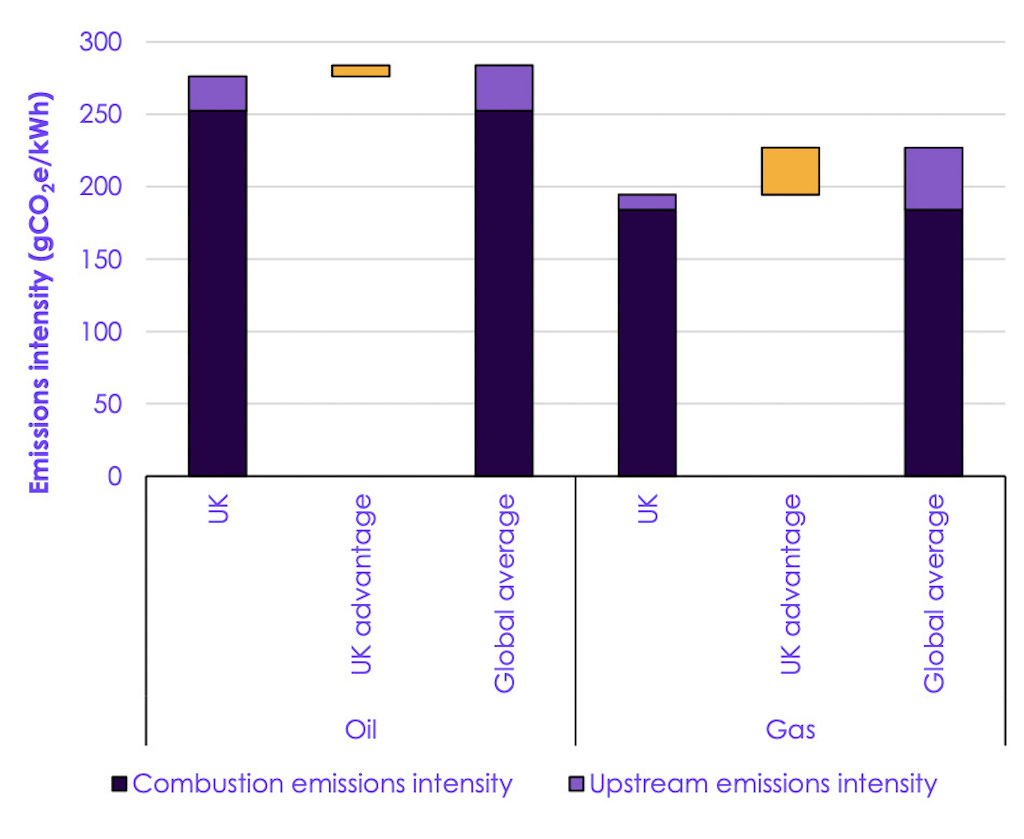
But, although the UK has a climate “advantage” in terms of emissions during production when compared to the global average, it is not outperforming Norway, the country it currently sources most of its oil and gas imports from.
An analysis published in 2022 found that, on average, UK production in the North Sea was nearly three times more emissions intensive than Norwegian production.
And the emissions intensity of UK oil and gas production has been on the rise. Analysis by Unearthed found that the emissions intensity of UK oil and gas production reached a record high in 2021, after declining slightly between 2018 and 2020.
Moreover, any new oil and gas expansion in the UK will add to the global picture of fossil-fuel expansion, meaning potential small climate gains from using domestic oil and gas over imports could be undermined.
Even if each unit of new UK gas production only adds a fifth of a unit to global gas demand overall, the upstream emissions advantage would be wiped out by higher usage elsewhere.
A recent UN review found governments’ current production plans would lead to about 57% more oil and 71% more gas in 2030 than would be consistent with keeping warming to 1.5C.
Claim 5: Ending new oil and gas licences would ‘harm the economy’
As outlined above, an end to oil and gas licences would not lead to production shutting down overnight, but rather facilitate a slow but steady decline in production into the 2040s and 50s.
By this time, the UK is expected to use far less oil and gas than at present – as people switch to using electric cars over petrol vehicles and heat pumps over fossil-fuel boilers, among other changes.
The reduced need to import oil and gas in the future is expected to improve the UK’s balance of payments deficit. (“Balance of payments” is a measure of cross-border transactions between the UK and the rest of the world.)
This is one of the major reasons why meeting the UK’s net-zero target could boost the country’s GDP in the long run, according to the CCC. In its assessment of how the country can reach net-zero by 2050, it concluded that meeting the target could see a GDP boost of around 2% within a decade.
While new oil and gas production creates economic activity, large sums of government money are also given to support fossil fuel production in the North Sea through subsidies and tax relief.
Analysis by the Liberal Democrats found that the UK government has given £20bn more in support to fossil fuel producers than those of renewables since 2015.
There is a risk that further oil and gas expansion in the UK could lead to “stranded assets” – infrastructure that cannot be used in future because there will no longer be a demand for it in a low-carbon economy.
In its most recent assessment report, the world’s climate authority, the Intergovernmental Panel on Climate Change (IPCC), concluded with medium confidence that oil and gas projects risk being stranded around 2050 under pathways for limiting global warming to 1.5C or 2C.
Claim 6: Ending new oil and gas licences would cause energy bills to ‘skyrocket’
The production of oil and gas in the North Sea has very limited effects on global energy prices, which determine the cost of UK energy bills.
This is something that the government itself has previously acknowledged, despite Shapp’s claims to the contrary.
Domestic UK oil and gas does not have much impact on global energy prices because the country is a relatively small producer, accounting for around 1% of global output.
Claim 7: Ending new oil and gas licences could threaten jobs
In one of his tweets criticising Labour, Shapps noted that the oil and gas industry currently supports 200,000 jobs – implying they would be put at risk by the policy of ending new oil and gas licences.
Back in May, the CCC published an analysis of how jobs might change as the UK strives for its net-zero target.
Its review of available data suggested that the gradual phase-down of high-emitting sectors, such as oil and gas production, could lead to there being 8,000-75,000 workers “whose jobs cannot continue in their current form”.
But it added that this would be outweighed by “extensive job creation”. It estimated that there could be between 135,000-725,000 net new jobs created by the transition to net-zero, in sectors such as renewable energy generation, retrofitting and electric vehicles.
This job creation is not “guaranteed” and is dependent on the government implementing measures to support and upskill its workforce on the journey to net-zero, the CCC noted.
A survey of 600 offshore workers in 2021 found that those looking to move from the fossil-fuel industry into green jobs in renewable power faced costly training fees, discouraging them from making the transition.
-
Factcheck: Why banning new North Sea oil and gas is not a ‘Just Stop Oil plan’






